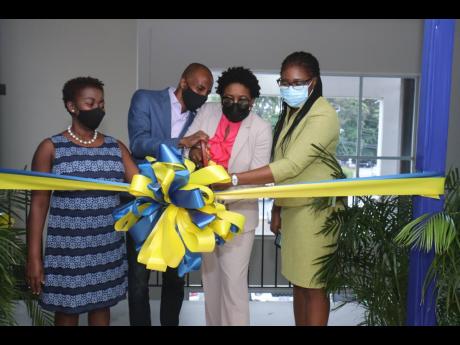Help businesses get into the formal economy – JCC president
WESTERN BUREAU:
LLOYD DISTANT, the president of the Jamaica Chamber of Commerce (JCC), is renewing the call for business operators to join Jamaica’s formal economic system instead of lingering in the informal sector, which includes unincorporated businesses owned by individuals or households.
“I understand the ‘hustle’ thing, as we all need to make money and to ensure our families are living and surviving. But I would certainly encourage us all to bear in mind that as we are doing these things, we should continue to encourage businesses to get into the formal economy,” said Distant, while addressing the official opening of the Montego Bay Chamber of Commerce and Industry’s (MBCCI) new office in Fairview, Montego Bay, yesterday.
The informal sector includes individual workers such as small-farm workers, retail salespeople, street vendors, domestic helpers, taxi operators, and owners of small businesses and micro enterprises.
According to Distant, Jamaica’s informal economy has increased since 2020, a phenomenon which he blamed on job losses experienced by Jamaicans during that time. He suggested that the MBCCI, through its availability of options for business operators, could help to curb that trend in western Jamaica.
INFORMAL ECONOMY GROWING
“The figure that came out in 2016 was that about 17 per cent of our economy was informal, and the figure in 2019 was about 13 or 14 per cent of our economy being informal. Coming into 2020, a lot of people lost their jobs, and their pivoting [method of compensating] was to start their own businesses. In my own mind, the informal economy has grown, but that is not good for the country,” said Distant.
“The MBCCI has a critical role to play in that regard, as you should continue to open up your opportunities for new businesses to join you. For you to guide them through that process to become a part of the official system will continue to be very important for the continued growth and development of Jamaica,” Distant added.
In October 2020, several months after the COVID-19 pandemic impacted Jamaica’s business operations, Distant suggested that the disease had helped to highlight the vulnerability of employees who work in the informal economy.
At that time, a COVID-19 study conducted by the Statistical Institute of Jamaica found that 57 per cent of Jamaican households saw a reduction of income between March, the time of the virus’ outbreak, and September that year. According to the study, 40,000 households sought government aid, 27,000 households got loans from friends and family, and 14,000 households started farming, animal rearing, and fishing to provide a source of food.

